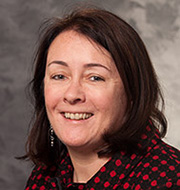Sept. 29, 2018:
The Big Ten Cancer Research Consortium (Big Ten CRC) has appointed internationally recognized breast cancer physician and researcher Ruth O’Regan, MD, as its chief scientific officer (CSO). Dr. O’Regan is the division head of hematology, medical oncology, and palliative care in the Department of Medicine at the University of Wisconsin School of Medicine and Public Health; and associate director for clinical research at the UW Carbone Cancer Center.
 The Big Ten CRC announced Dr. O’Regan’s appointment today during the consortium’s annual Summit at Big Ten Conference headquarters in Chicago.
The Big Ten CRC announced Dr. O’Regan’s appointment today during the consortium’s annual Summit at Big Ten Conference headquarters in Chicago.
“Our commitment to advancing innovative new cancer treatments for our patients is helped tremendously by the Big Ten Cancer Research Consortium,” said Howard Bailey, MD, director, University of Wisconsin Carbone Cancer Center. “Having one of our own lead all the Big Ten cancer centers in this endeavor is a noteworthy accomplishment. It will ensure increased access to our patients for cutting-edge cancer therapies.”
An active member of the Big Ten CRC’s Breast Clinical Trial Working Group, Dr. O’Regan is the sponsor-investigator of the consortium’s BTCRC-BRE15-024 study. She joined the Big Ten CRC Steering Committee in 2015, representing the UW Carbone Cancer Center, and currently serves as chair of the Steering Committee.
Dr. O’Regan will serve a renewable three-year term as CSO. In this role, she will guide the research and scientific mission of the consortium and will work closely with the Steering Committee and Clinical Trial Working Groups to identify and support the most promising clinical trials to be conducted through the consortium. She will provide oversight to ensure the Big Ten CRC conducts research in a scientifically, medically, and ethically robust manner. Dr. O’Regan will serve as the primary spokesperson for the research and scientific activities of the consortium, and she will support the Steering Committee and Clinical Trial Working Groups in their interactions with the biotech and pharmaceutical industry.
“Collaboration is truly key to advancing cancer research through innovative clinical trials. It’s truly a privilege to be leading this group of collaborators across Big Ten institutions,” said Dr. O’Regan. “Providing better patient care is our ultimate goal, and I know that together, we will be making inroads that will have a true global impact.”
Before she joined the UW Carbone Cancer Center in 2015, Dr. O’Regan was professor of hematology and medical oncology at Emory University School of Medicine, where she also served as chief of hematology and medical oncology at the Georgia Cancer Center for Excellence at Grady Memorial Hospital, medical director of Winship Cancer Institute’s Glenn Family Breast Center, vice chair for educational affairs for the Department of Hematology and Medical Oncology, and director of the hematology oncology fellowship. Dr. O’Regan earned her medical degree from University College, Dublin, Ireland and completed her internal medicine residency at the Medical College of Wisconsin and her hematology oncology fellowship at Northwestern University.
The University of Wisconsin Carbone Cancer Center is the only comprehensive cancer center in Wisconsin, as designated by the National Cancer Institute. More than 300 researchers and physicians across the University of Wisconsin-Madison campus work together to advance cancer research through innovative new ways to prevent, detect and treat cancer. The UW Carbone Cancer Center sees more than 30,000 patients annually for initial diagnosis, treatment, second opinions, and follow-up care and offers more than 250 clinical trials for patient participation. For more information, visit uwhealth.org/cancer.
About the Big Ten Cancer Research Consortium: The Big Ten Cancer Research Consortium was created in 2013 to transform the conduct of cancer research through collaborative, hypothesis-driven, highly translational oncology trials that leverage the scientific and clinical expertise of Big Ten universities. The goal of the Big Ten Cancer Research Consortium is to create a unique team-research culture to drive science rapidly from ideas to new approaches to cancer treatment. Within this innovative environment, today’s research leaders collaborate with and mentor the research leaders of tomorrow with the unified goal of improving the lives of all patients with cancer.
About the Big Ten Conference: The Big Ten Conference is an association of world-class universities whose member institutions share a common mission of research, graduate, professional and undergraduate teaching and public service. Founded in 1896, the Big Ten has sustained a comprehensive set of shared practices and policies that enforce the priority of academics in the lives of students competing in intercollegiate athletics and emphasize the values of integrity, fairness and competitiveness. The broad-based programs of the 14 Big Ten institutions will provide over $200 million in direct financial support to almost 9,500 students for more than 11,000 participation opportunities on 350 teams in 42 different sports. The Big Ten sponsors 28 official conference sports, 14 for men and 14 for women, including the addition of men’s ice hockey and men’s and women’s lacrosse since 2013. For more information, visit www.bigten.org.
















Subscribe to the Big Ten CRC Newsletter X
X Facebook
Facebook YouTube
YouTube